June 10, 2020
DeWorm3 COVID-19 Response: BICO Malawi
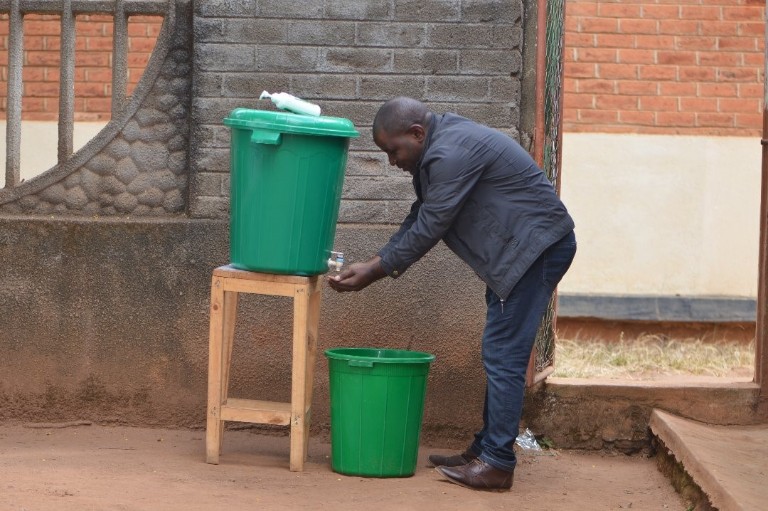
Hand washing before entry into the offices.
See the original article published by the National History Museum, London here.
As the world continues to combat the spread of COVID-19 and adapt to life under stringent new public health measures, the Natural History Museum (NHM) wishes to celebrate the resilience and fortitude of its research partners who are contributing to the international virus response. The Blantyre Institute for Community Outreach (BICO) in Malawi is playing a pivotal role in the national Malawian COVID-19 response; a role which BICO Director Professor Khumbo Kalua states is facilitated by the support of international research collaborations such as DeWorm3. BICO is a collaborative partner of NHM in delivering the DeWorm3 project, a Bill & Melinda Gates Foundation investment to assess the feasibility of breaking transmission of intestinal worms (soil-transmitted helminths) in Benin, India, and Malawi.
When the first reported case of COVID-19 was recorded in Malawi on 02 April 2020, the Malawian government initiated a series of guidelines informed by WHO policy to contain the spread of the virus; this included halting fieldwork which interrupted the implementation schedule of DeWorm3 activities. After careful monitoring of the situation, the Malawian government granted the continuation of donor-funded projects providing they could be implemented within the COVID-19 restrictions. The Ministry of Health (DHO) encouraged all existing public health platforms to assist with the sensitization and implementation of COVID-19 activities.
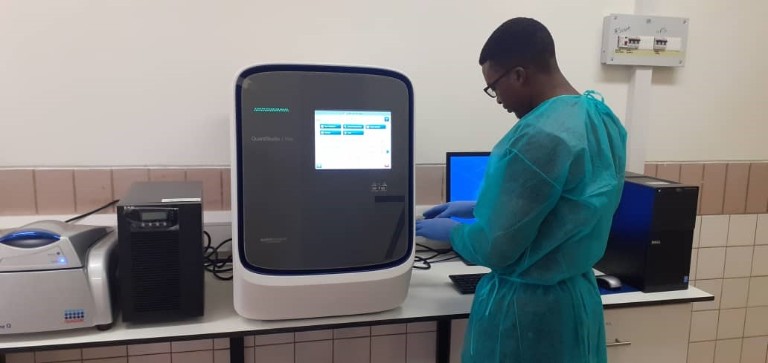
A lab scientist at College of Medicine employed under the DeWorm3 project working on COVID-19 samples as part of the national support to the COVID-19 fight in Malawi.
See the original published article by the National History Museum, London here.
As part of NHM’s Vision and Strategy for 2031 developed with the United Nations Sustainable Development Goals (SDGs) in mind, NHM has advocated for increased capacity building as part of its collaborations with developing nations; the DeWorm3 project focuses on SDG 3 (Good Health & Well-being) and SDG 10 (Reduced Inequalities). Through NHM, DeWorm3 ensured that BICO received sufficient resources, equipment, and training to not only deliver on their contributions to the DeWorm3 project itself but to develop their own local capacity in molecular diagnostics to benefit the community. The molecular laboratory facilities at the College of Medicine which have been established with support from collaborations including DeWorm3 have allowed for national testing of COVID-19 which benefits the entire nation. Additionally, the community-wide infrastructure and sensitization frameworks already established as part of DeWorm3 have facilitated a rapid community response to the COVID-19 threat, slowing the spread of the virus which as of 06 June 2020 now involves only 357 active cases and 4 deaths.
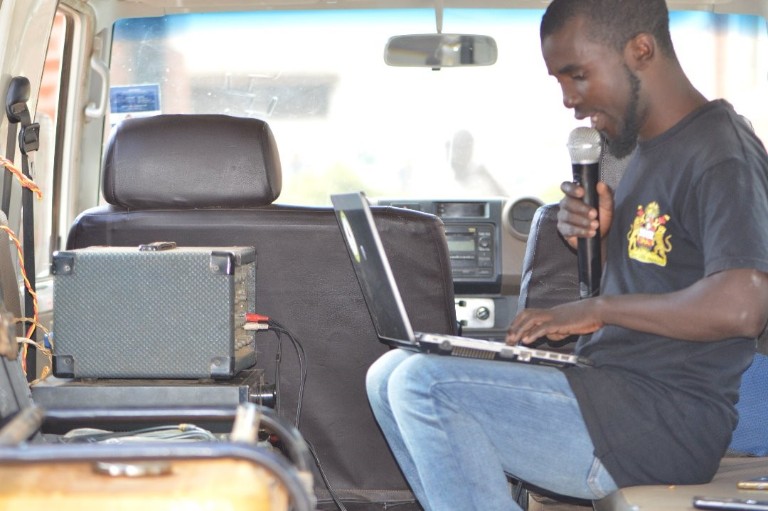
DJ (a health worker) announcing promotional messages and playing music about COVID-19 at the back of the car. The vehicle moved throughout all health centres in Namwera.
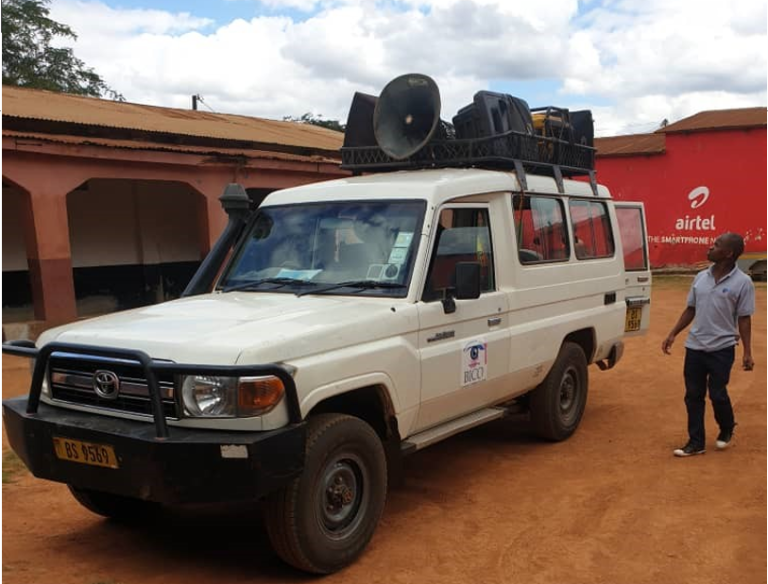
A BICO/DeWorm3 vehicle with speakers spreading messages about COVID-19 in Namwera Mangochi.
Following advice from the government and with stringent guidelines in place, DeWorm3 activities have resumed with training for field staff on how to conduct their work while preventing the spread of COVID-19. Additional training has been provided on what causes the disease, how it spreads, signs and symptoms and preventative measures- all to support and benefit the communities they work in, and all workers are thoroughly screened and provided with the necessary PPE to conduct their work safely.
Though undoubtedly a difficult time, NHM is proud to celebrate and support the resilience, adaptability, and perseverance demonstrated by the whole team at BICO.
DeWorm3 supported BICO activities in collaboration with the Mangochi DHO and National COVID Programme:
- Approximately 400 trained and oriented in COVID-19: 127 support staff from 16 health centres, 85 enumerators, 75 nurses and medical assistants, 14 immigration officers posted at the Malawi Mozambique borders, 32 police offices, 31 mobile police, 6 senior chiefs, 3 health promotion officers, 6 environmental health officers, 8 BICO staff and 11 drivers
- Over 400 masks, sanitizers and cleaning solutions provided to health workers
- Provision of hand-washing facilities and promotion of social-distancing in all communities in Namwera
- Temperature checks using infrared thermometer initiated in Namwera health centres and at BICO offices
- Sensitization in all 16 health centres in Namwera and Mangochi including COVID messaging through local radio stations covering a population of over 400,000
- Provision of DeWorm3 vehicles to support the national COVID-19 contact tracing and follow-up system
- Use of DeWorm3 funded molecular facilities at the College of Medicine for nationwide COVID-19 testing
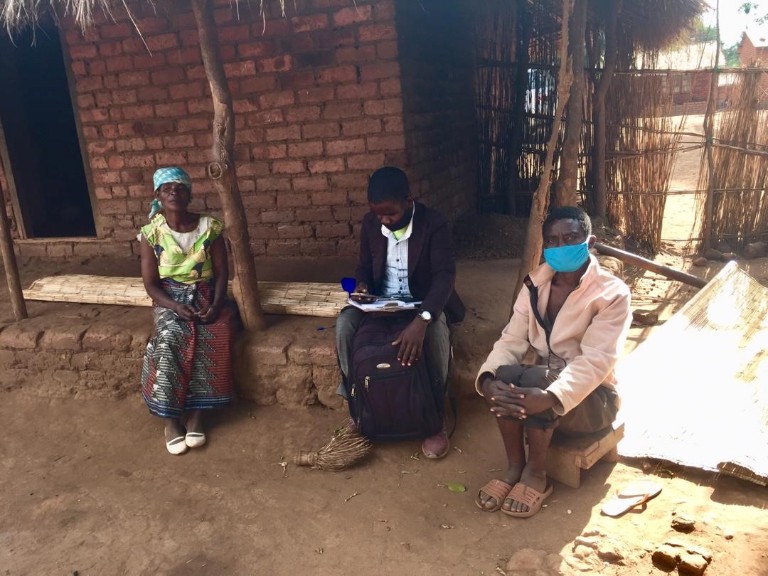
An enumerator collecting census data in the community while observing social distancing.